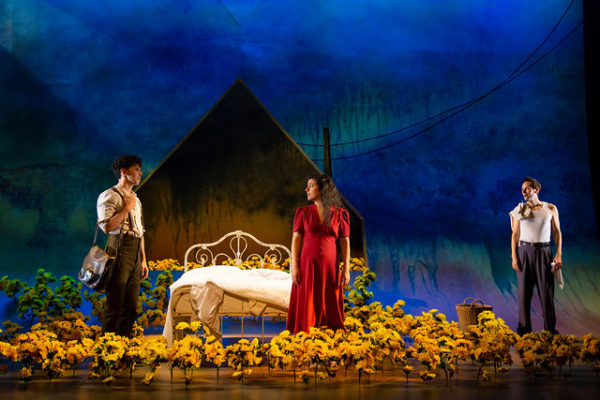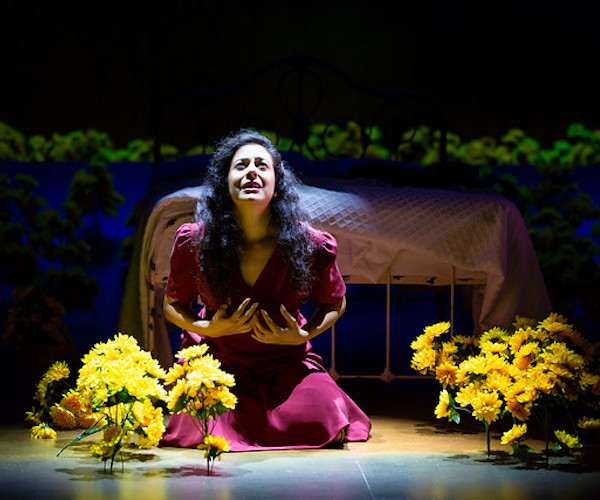Theater Review: “Yerma” — The Tragic Power of Desire
By Erik Nikander
Melinda Lopez’s superb new translation of Yerma makes the language of the play approachable, even conversational, without losing the beauty of Lorca’s poetry.
Yerma by Federico García Lorca, adapted and translated by Melinda Lopez. Directed by Melia Bensussen. Staged by the Huntington Theatre Company at the Calderwood Pavilion at the BCA, 527 Tremont Street, Boston, MA, through June 30.

Ernie Pruneda (Victor), Nadine Malouf (Yerma) and Christian Barillas (Juan) in the Huntington Theatre Company production of “Yerma.” Photo: T Charles Erickson.
Given only the barest synopsis, Yerma might come across as an outdated, conservative play. It is the story of a woman determined to have a child and be a stay-at-home mom — hardly what most would consider a forward-thinking, 21st century outlook! But adapter/translator Melinda Lopez envisions the central conflict as the struggle of an outcast against society’s expectations, a battle that would seem to be eternally modern. Dramatist Federico García Lorca provided the play’s poetic center, but this version of Yerma makes the text thrum with a contemporary warmth and familiarity without neglecting its lyricism.
In a rural community where families must farm to survive, a young wife named Yerma (Nadine Malouf) is desperate to have a son. Her husband Juan (Christian Barillas) wants a child too, but more to please Yerma than anything else. He has a flock to tend to, as does Victor (Ernie Pruneda), Juan’s old friend and Yerma’s girlhood crush. As the years pass and Yerma’s hopes are dashed, she seeks advice from her neighbors, including Maria (Marianna Bassham), Marta (Evelyn Howe), and Incarnación (Alma Cuervo). Stymied at every turn, Yerma’s aching need to procreate drives her to make an impossible decision.
In terms of narrative economy, Yerma is masterly. Lorca’s background as a poet no doubt influenced how, in just a few words, he could convey richly complicated feelings and desires. Yet, though Yerma runs just under ninety minutes, its portrait of society manages to feel both truthful and expansive in its scope. Not a word is wasted: each bit of dialogue, every metaphor, illuminates Yerma’s psychological state, or tells us something about society she finds herself caught up in, or both.
Lopez’s superb new translation of Yerma makes the language of the play approachable, even conversational, without losing the beauty of Lorca’s poetry. By highlighting Yerma’s infectious optimism in the early scenes, the adaptation heightens the second half’s tragedy. Lopez also adds texture to Yerma and Juan’s relationship, their disappointments and false hopes serving as fertile ground for resentment. All the subtle alterations and reworking of lines show a clear respect for Lorca’s intent; Lopez succeeds at putting her own stamp on the work without disrupting or diverting the play’s dramatic contours.
There are some minor stumbles along the way, but the Huntington Theatre Company’s production matches the text’s primal emotional power. As Yerma, Nadine Malouf is both fierce and tender, making the woman’s obsession with having a baby fully involving. Over the course of the play, bitterness seeps into her voice and her posture; we feel her bright hopes dimming, transforming into a poisonous resentment. Malouf is particularly good at conveying Yerma’s perception of herself as an outcast. Boxed in by society’s rules (and moral hypocrisy), she suffocates, and this agony takes on a universal resonance.

Nadine Malouf (Yerma) in the Huntington Theatre Company production of “Yerma.” Photo: T. Charles Erickson
As the hardworking Juan, Christian Barillas provides a convincing portrait of a lean and suspicious man who simply can’t makes sense of the radical nature of Yerma’s desire. Affection and unease commingle in their relationship — before it explodes into open conflict. Thankfully, Bensussen and Barillas resist the temptation to make Juan an easy or obvious villain. He clearly loves Yerma, but the two look at the world in such different ways that the gulf between them widens and widens. Less effective, however, is Ernie Pruneda as Victor. The actor is adept at suggesting Victor’s good nature, but there’s no spark of eros between him and Yerma, no passionate stolen glances to stoke Victor’s suspicions. This lack of palpable sexual temptation feels like a missed dramatic opportunity.
Director Bensussen’s staging of Yerma strikes a compelling balance between the intimate and the spectacular. She guides her ensemble cast with expert skill. The music, performed live by Juanito Pascal on guitar and Fabio Pirozzolo on percussion, effectively underscores the show’s most dramatic moments; the musicians also accompany the brief songs scattered throughout the piece. The execution of these tunes sometimes falters, but they still add valuable bursts of emotional color to the production. The play’s visual character reaches for a sense of archetypal timelessness, defined in part by Olivera Gajic’s colorful costumes. Cameron Anderson’s set design and Brian J. Lilienthal’s lighting are highly evocative, framing Yerma’s pain with the heightened quality of a dreamscape.
Finally, despite its problems, this staging of Yerma soars on the enormous power of Malouf’s performance. She digs deep into the piece’s ample dramatic complexity, originated by Lorca and invigorated by Lopez, of a woman’s unbounded desire for something simple and elemental. Even those who don’t share her desire for a baby will connect with her need to belong.
Arts Fuse interview with Melinda Lopez.
Erik Nikander is a critic, playwright, and filmmaker based in the New England area. His film criticism can be read on Medium and his video reviews on a variety of topics can be viewed on Youtube at EWN Reviews.
Tagged: Huntington Theater Company, Melia Bensussen, Melinda-Lopez
